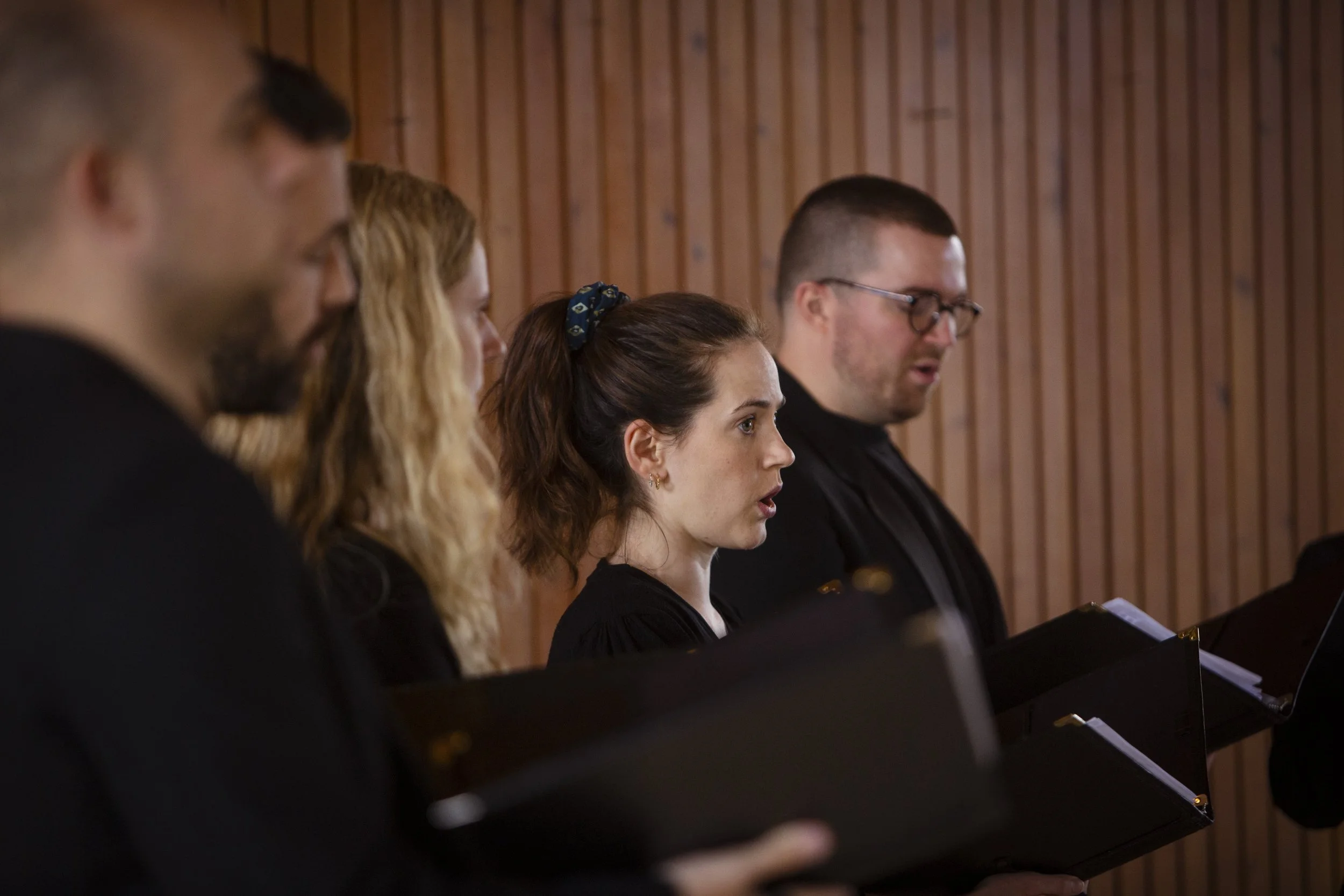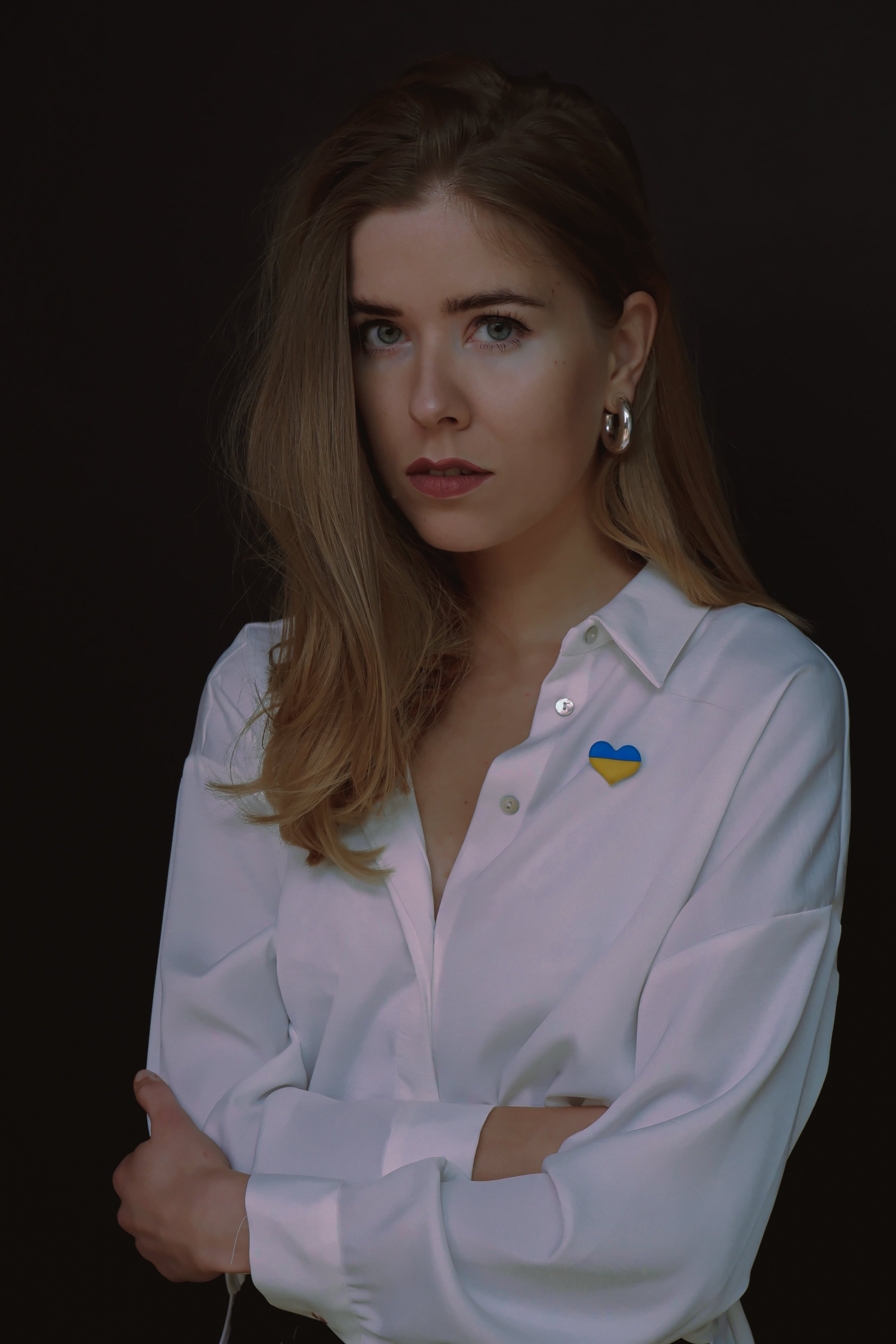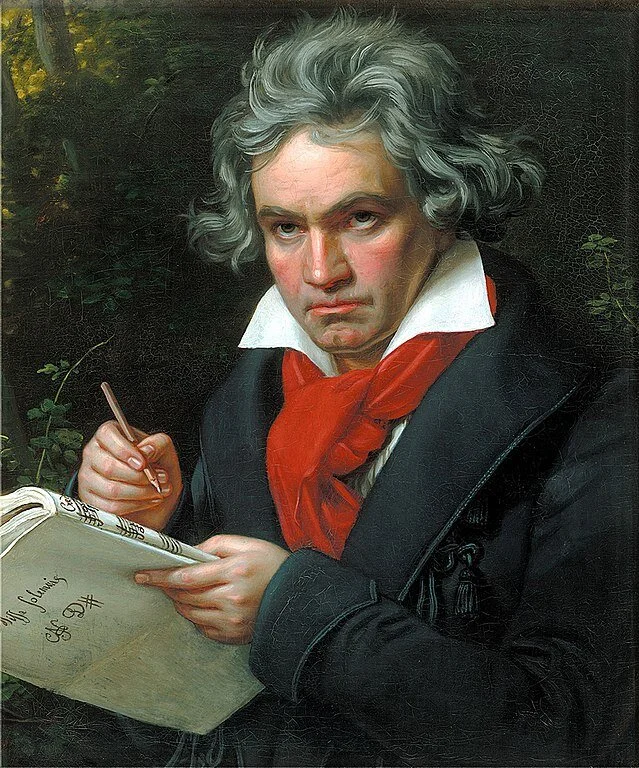Commission for Ukraine
We are thrilled to announce that we have commissioned Ukrainian composer Natalia Tsupryk to write a new choral work reflecting on the devastating ongoing conflict in her home country.
The piece will set text by renowned Ukrainian poet Serhiy Zhadan with quotations from one of President Volodymyr Zelensky’s many powerful speeches. Together, we aim to create a musical expression of solidarity with the people of Ukraine as they continue to suffer at the hands of Vladimir Putin.
We also hope that the piece will be a catalyst for connection, providing a creative vehicle for choirs to meet and sing with displaced Ukrainians in their communities. If you would like to register interest in performing Natalia’s piece with your choir, please get in touch.
We will be recording the piece in the coming weeks and will share updates on our social media channels and dedicated mailings.
natalia tsupryk
© Olena Korniienko
“With the full-scale invasion of Ukraine, my life was split into before and after, and although the Russian war really started eight years ago, I was still deeply shaken.
Everything I do now, both professionally and personally, is about Ukraine. Death is everywhere and people never know which of their loved ones might be next. Ukrainians desperately need the world’s assistance to win and end this cruel war.”
Defined by a distinctive use of strings and vocals, Natalia's music draws from her classical background to combine elements of folk, electronic, and classical.
One of her most recent solo works Elegy for Spring is a part of Piano Day Vol.1 Compilation released with Nils Frahm's label Leiter. Another single The Trees Will Swing is a part of STRING LAYERS VOL. II compilation released by 7K!
Natalia has scored award-winning films across fiction, documentary, and animation that have screened internationally at festivals such as Palm Springs, Indy Shorts, PÖFF, and were short-listed for BAFTAs.
TEXT
It is us who sing in the quiet of the night
when the inner town is silent
burying the seeds of our sighs
in the breath of black earth.
- from The History of Snow by Serhiy Zhadan
(trans. Sasha Dugdale, Oksana Maksymchuk)
Our land was sown with bullets and shells, but no enemy was able to take root here.
There is no occupier who can take root in our free land.
We are free people who have their own path.
- from President Volodymyr Zelensky’s speech on the Day of Victory of Nazism in World War II (9 May 2022)
Artwork
Prayer by Masha Krivopishina
SUPPORT
This project has been made possible through our collaboration with several key partners, from the commissioning phase through to recording and release.
Commission
We were able to commission Natalia thanks to generous support from Chris Gunness, Director of the Myanmar Accountability Project.
Ukrainian Catholic Cathedral
We are grateful to Bishop Kenneth Nowakowski of the Ukrainian Catholic Cathedral of the Holy Family of London for allowing us to record the single at the Cathedral in Mayfair and for connecting us with VIVO Vocal Quartet who sing the liturgy there every Sunday.
Stabat Mater Reviews
For Holy Week 2022, we teamed up with renowned viol consort Fretwork to present a programme of contemplative music reflecting on the Easter story by Arvo Pärt (b. 1985) and Robert White (1538-1574).
We performed the programme in Oxford and Winchester before concluding the series at St John’s Smith Square in London as part of their Easter Festival. This final concert was reviewed by John Hutchings for Planet Hugill and Andrew Benson-Wilson.
Photo: Nick Rutter
“This partnership with the Fretwork was one of near-perfection, unforgettable, and one to watch”
“Ultimately this was less a concert performance of curated works of sound, but something more immersive, cohesive, and intimate. The synergy between each voice and viol made this possibly the finest combination of voices and instruments I've heard in years: under Tom Herring’s leadership SANSARA are at the forefront of curating excellence in sonority, ensemble and precision. This partnership with the Fretwork was one of near-perfection, unforgettable, and one to watch.”
(read the full review)
“A most moving performance...impressive and sensitive”
(read the full review)
New Single 'My North' out now
My North - Rebecca Dale
Our latest release is out now on all streaming platforms.
My North is a new piece by Rebecca Dale, commissioned as part of our Rite to Grieve project.
Premiered on 29 March 2022 at a commemorative event at the National Covid Memorial Wall, My North was commissioned as part of our ground-breaking Rite to Grieve project, uniting choral music with peer-to-peer grief support in the wake of the pandemic.
Dale's stunning new piece sets fragments from W H Auden's Funeral Blues and seeks to capture something of the collective grief experienced by society since early 2020.
Improvised passages of the piece are used during our Rite to Grieve workshops, presented in partnership with The Grief Series. As such, this piece captures the creative process of these sessions in a musical memorial for participants and the wider public.
This initial release will be followed by a second version of the piece featuring spoken word using text submitted by participants in our workshops.
National Covid Memorial Wall
We’re honoured to have been invited to take part in a special ceremony at the National Covid Memorial Wall on Tuesday 29 March to celebrate the one year anniversary of the wall and its first red heart.
We will be performing at the beginning and end of the ceremony, giving the world premiere of our new commission My North by Rebecca Dale, composed as part of our Rite to Grieve project which combines choral music with peer-to-peer grief support.
The event is free to attend open to the general public. If you wish, you can register for the event via the button below.
Arvo Pärt with Fretwork
Stabat Mater
We’re excited to announce our collaboration with renowned viol consort Fretwork with concerts in Oxford, Winchester and London.
With concerts at some of our favourite venues, this series is not one to miss. We’ll be returning to SJE Arts in Oxford on Thursday 31 March before performing at our spiritual home of St Cross, Winchester the following week on Thursday 7 April. The third and final performance will take place at St John’s Smith Square in London as part of their Easter Festival.
General Booking for London opens on 21 February
“the finest viol consort on the planet ”
join our board
TRUSTEE RECRUITMENT
We are excited to be recruiting new trustees to join our Board.
Trustees will have a key role in delivering our Giving Voice creative strategy - a forward-thinking and progressive vision, designed to increase our social impact and build long-term sustainability as we continue to develop and grow.
Wiltshire Music Centre Live Videos
Live performances from our concert at the Wiltshire Music Centre are now online.
Back in June, we had a wonderful time performing at the Wiltshire Music Centre in Bradford on Avon. The concert was our first with a live audience and was also streamed to a virtual audience watching from home. We’re now able to upload the majority of the concert to share online and have created a special playlist on our Youtube channel and added the videos to our Media page.
Christmas Concert Now On Sale
Tickets for our Christmas concert at the beautiful St Cross Church in Winchester are now on sale.
Make sure to book yours now via the button below to avoid missing out.
Invisible Cities - Out Now
new release
Our latest album Invisible Cities is out today - 28th May 2021 - on all streaming platforms. We also have physical copies you can buy direct from us using the button below.
programme note
If (like us) you don’t have a CD player anymore, here’s Tom’s programme note for the album.
Invisible Cities is a sequence of sacred choral works and electronic refractions composed by Marco Galvani. The album was initially conceived as a collection of Marco's choral music, selected to showcase his distinct voice and consolidate our relationship with him as one of our Associate Composers. In March 2020, everything changed, and we had to postpone our original recording sessions.
Suddenly, we were spread all over the UK, not knowing when we would be able to meet, let alone sing together. We began to reflect on how best to reimagine the project to address the extraordinary circumstances of the pandemic and its paralysing effect on society the world over. During this time, certain passages of text from the repertoire began to take on fresh significance. In particular, the famous line from the Lamentations of Jeremiah: 'Quomodo sedet sola civitas plena populo' / 'How lonely lies the city that was full of people'.
As cities around the world fell silent, we were reminded of Italo Calvino's novel Invisible Cities, with its fantastical places and meditations on humanity - vividly described by Marco Polo to the ageing Emperor Kublai Khan. Connections between people - real or imagined - are a recurring theme in the novel and something we wanted to draw on as we contemplated the album anew.
The recording sessions in October 2020 were the first time the choir had sung together in person in several months and a timely reminder of the power of a cappella choral music. Our aim was to invest the music with a sense of longing and passion - giving voice to feeling in a time of social isolation.
There runs an invisible thread that binds one living being to another for a moment, then unravels, then is stretched again between moving points as it draws new and rapid patterns so that at every second the unhappy city contains a happy city unaware of its own existence.
The sequence is built around Marco's setting of the Lamentations. Originally commissioned by Jeremy Summerly for The Queen's College Chapel Choir in 2013, they exemplify his distinct brand of polyphony mixed with passages of stasis and rich chordal textures. We first performed the set at the 2016 Passiontide at Merton festival in Oxford and have wanted to record it ever since. Throughout, Marco explores modal harmony with each tonal center derived from the chant passages that open the two parts. This Calvino-like structural device ties the whole set together, underpinning the surface textures with a subtle yet steady harmonic trajectory.
Drawing on famous settings by composers such as Thomas Tallis and Alonso Lobo, Marco gives considerable space to the Hebrew letters that punctuate the verses. Each one is distinct in texture and colour, and yet they all reside in the same dimension - a timeless space above and beyond the plane of the more descriptive passages. These passages form the basis for the four electronic tracks on the album which frame the choral pieces, drawing threads between them and providing space for reflection.
Between the two parts of the Lamentations is Ubi caritas, with its uplifting message of charity and love. Marco's setting stems from the plainsong chant which is presented in a series of variations punctuated by more declamatory passages. With its reserved sense of optimism, this piece represents the importance of community and hope in times of fear and uncertainty.
Marco Polo describes a bridge, stone by stone.
“But which is the stone that supports the bridge?” Kublai Khan asks.
“The bridge is not supported by one stone or another,” Marco answers, “but by the line of the arch that they form.”
Kublai Khan remains silent, reflecting. Then he adds: “Why do you speak to me of the stones? It is only the arch that matters to me.”
Polo answers: “Without stones there is no arch.”
One of the core questions posed by this album is how sacred texts can speak to us today, particularly beyond performance in religious contexts and Christian spaces. The middle section of the sequence features settings of three Marian texts, each with a strong sense of devotion to the queen and gate of heaven. It is this idea of a celestial portal that gives this triptych its structural role in the wider context of the sequence, forming the central phase with two connected but independent worlds before and after.
Traveling, you realize that differences are lost: each city takes to resembling all cities, places exchange their form, order, distances, a shapeless dust cloud invades the continents. Your atlas preserves the differences intact: that assortment of qualities which are like the letters in a name.
In the Lamentations, we hear of the destruction of Jerusalem and the plight of those in exile. Super flumina Babylonis is a lament for the lost city, with its remarkable line 'Quomodo cantabimus canticum Domini in terra aliena?' / 'How do we sing the Lord's song in a strange land?', strikingly set here by Marco. Jerusalem has become an invisible city, existing only in the memory of its captive and homeless population. As with the Lamentations, this text resonates today - particularly for refugees fleeing war and persecution around the world, but also in the global context of the pandemic. The closing verses speak of the importance of collective memory - the imagined worlds of the mind's eye.
The final choral work in the sequence is Marco's setting of O sacrum convivium. This text is also about memory and imagination, inspired by the 'sacred banquet' of Holy Communion where the memory of Christ's Passion is renewed, 'the mind is filled with grace, and a pledge of future glory to us is given.' Marco's approach to the text is particularly striking for its slow and steady increase in tempo and energy. Beginning with calm stasis, the music changes gear with each new line of text until the rapturous Alleluia bursts through in cascading melodies in all voice parts before gradually dissipating back to stillness.
The inferno of the living is not something that will be; if there is one, it is what is already here, the inferno where we live every day, that we form by being together. There are two ways to escape suffering it. The first is easy for many: accept the inferno and become such a part of it that you can no longer see it. The second is risky and demands constant vigilance and apprehension: seek and learn to recognize who and what, in the midst of the inferno, are not inferno, then make them endure, give them space.
At time of writing in March 2021, we remain in a liminal phase - caught between two worlds, the past and future simultaneously illusory and unreal. This album is our attempt to capture something of this moment, recorded in the midst of this stretched out 'in between'. We invite you to listen to the sequence in full and for it to be the soundtrack to personal reflection - as Marco Polo observes in Invisible Cities, "it is not the voice that commands the story; it is the ear."
Tom Herring
Genesis Foundation Kickstart Fund
We’re hugely grateful to have been included in the first round of grants from the Genesis Foundation Kickstart Fund.
The grant of £10,000 will go towards our White Rose project and specifically the recording of a programme of choral music which will feature on a new album and in our podcast series telling the story of the White Rose.
This project is central to delivering our Giving Voice creative strategy and we are busy planning our sessions and developing the podcast script in close partnership with The White Rose Project.
Paul Hamlyn Foundation
We’re delighted to have received a grant of £18,000 from the Paul Hamlyn Foundation.
Part of PHF’s Emergency Fund, the grant will go towards projects Rite to Grieve and White Rose as well as contributing to our core costs. This support is a huge boost to both projects, putting them on sure footing as we take the next steps in delivering our Giving Voice creative strategy.
Paul Hamlyn Foundation (PHF) was established by Paul Hamlyn in 1987. He died in 2001 and left most of his estate to the Foundation, creating one of the largest independent grant-making foundations in the UK. PHF use their resources to support social change, working towards a just and equitable society in which everyone, especially young people, can realise their full potential and enjoy fulfilling and creative lives.
Invisible Cities release dates
Our new album Invisible Cities will be released on Friday 28 May.
We’re excited to share the release dates of our latest recording of choral and electronic music by our Associate Composer Marco Galvani, including a special online launch event.
Friday 7 May - Ubi caritas (single)
Friday 14 May - Ave sanctissima Maria (single)
Thursday 27 May - Launch Event
Friday 28 May - Full album release
Artwork by Charlie Barton


















